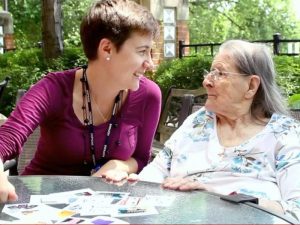Guest Blog by: Maranda Trahan, Ph.D., BCBA-D
Wellness Director, Kisco The Fountains of Melbourne
Look around: One in three individuals born today will develop dementia later in life. Dementia is an umbrella term for any memory problem, including Alzheimer’s Disease, Vascular Dementia, Mixed Dementia, Frontal Temporal Dementia and over 70 others. Nearly 6 million Americans are affected and that number is expected to double over the next 20 years.
 Not only does this diagnosis affect an individual’s ability to do everyday activities like ambulating, eating, bathing, dressing, it also affects their language or verbal behavior. Although we have a long way to go and we still don’t know the exact patterns of verbal decline (e.g., can requests or mands maintain longer than labels or tacts? How does audience affect the recall of events?), the field of behavioral gerontology has assessed, intervened, and provided recommendations about verbal behavior in dementia care.
Not only does this diagnosis affect an individual’s ability to do everyday activities like ambulating, eating, bathing, dressing, it also affects their language or verbal behavior. Although we have a long way to go and we still don’t know the exact patterns of verbal decline (e.g., can requests or mands maintain longer than labels or tacts? How does audience affect the recall of events?), the field of behavioral gerontology has assessed, intervened, and provided recommendations about verbal behavior in dementia care.
Interventions Based on Evidence

Two lines of research that have evolved out of this field in recent years show that visual supports and repeated trials have a clear impact on evoking and maintaining verbal behavior in dementia. For example, recent studies have demonstrated that if an individual with dementia is given a “memory book” filled with visual stimuli of past and present preferences, the individual will reduce repetitive vocalizations and increase the use of more appropriate and functional language. Spaced-retrieval is a delayed recall intervention, whereby seniors are asked to recall targeted information after longer and longer periods of time. While some individuals need modifications to the procedure in order to find benefits, researchers continuously show that individuals with dementia can remember people, places, phrases, answers, and actions after repeated trials.
Other studies have suggested that verbal antecedents affect how an individual with dementia will respond. For example, preliminary evaluations show that open-ended questions can lead to more bizarre statements, whereas closed-ended questions can evoke more appropriate speech from the person with dementia. Taken together, results from the behavior analytic literature suggest that sometimes simple modifications can make a world of difference in conversations with individuals diagnosed with dementia.
Dealing with the Day-to-Day, Looking to the Future

An individual’s loss of coherent conversations due to dementia causes depressing and worried effects in spouses and family members. Families struggle with the fact that their loved one will become fully dependent on care and unable to communicate basic needs. In spite of these tough facts, families and clinicians must focus on helping individuals in the moment. If we concentrate less on what the individual will lose in 3 years, 1 year, or 6 months; we can focus instead on the here and now. Because there is no cure for dementia and none on the horizon, we must place value on quality of life throughout the clinical and diagnostic process. Clinicians should focus on antecedent manipulations to produce verbal behavior. We should fill the individual’s environment with familiar and pleasurable conversations to facilitate dialogue. We should encourage meaningful activities throughout the day which will give our loved ones ample opportunity to engage in appropriate speech.
The only way to “beat” dementia is to have a clinical plan in place that helps deal with the day-to-day behavioral issues and caregiver stresses. Whether those stresses are related to verbal behavior or activities of daily living, behavior analysts can have a large role in that care plan process. I encourage those interested in making a difference in dementia care to reach out to already-established behavior analytic agencies and petition those companies to expand care to geriatrics. Business plans can be medically beneficial as well as profitable. Beware: though senior life is ready and willing to accept behavior analysts, the marketplace will be bureaucratic, delayed, and filled with red tape. Change is difficult, but the field will remain at rest until we act.
Dr. Maranda Trahan received her bachelor’s degree from Louisiana State University and her doctorate degree from Southern Illinois University, Carbondale. She completed a three-year postdoctoral fellowship in geriatric medicine and gerontology at Johns Hopkins University and currently resides in Florida where she maintains a private practice and is the Wellness Director for The Fountains – A Senior Living Community in Melbourne Florida. Since 2003, she has developed and implemented behavioral programs for a variety of individuals with challenging behaviors. She now specializes in behavioral assessment, caregiver training, and program development for older adults with dementia.
